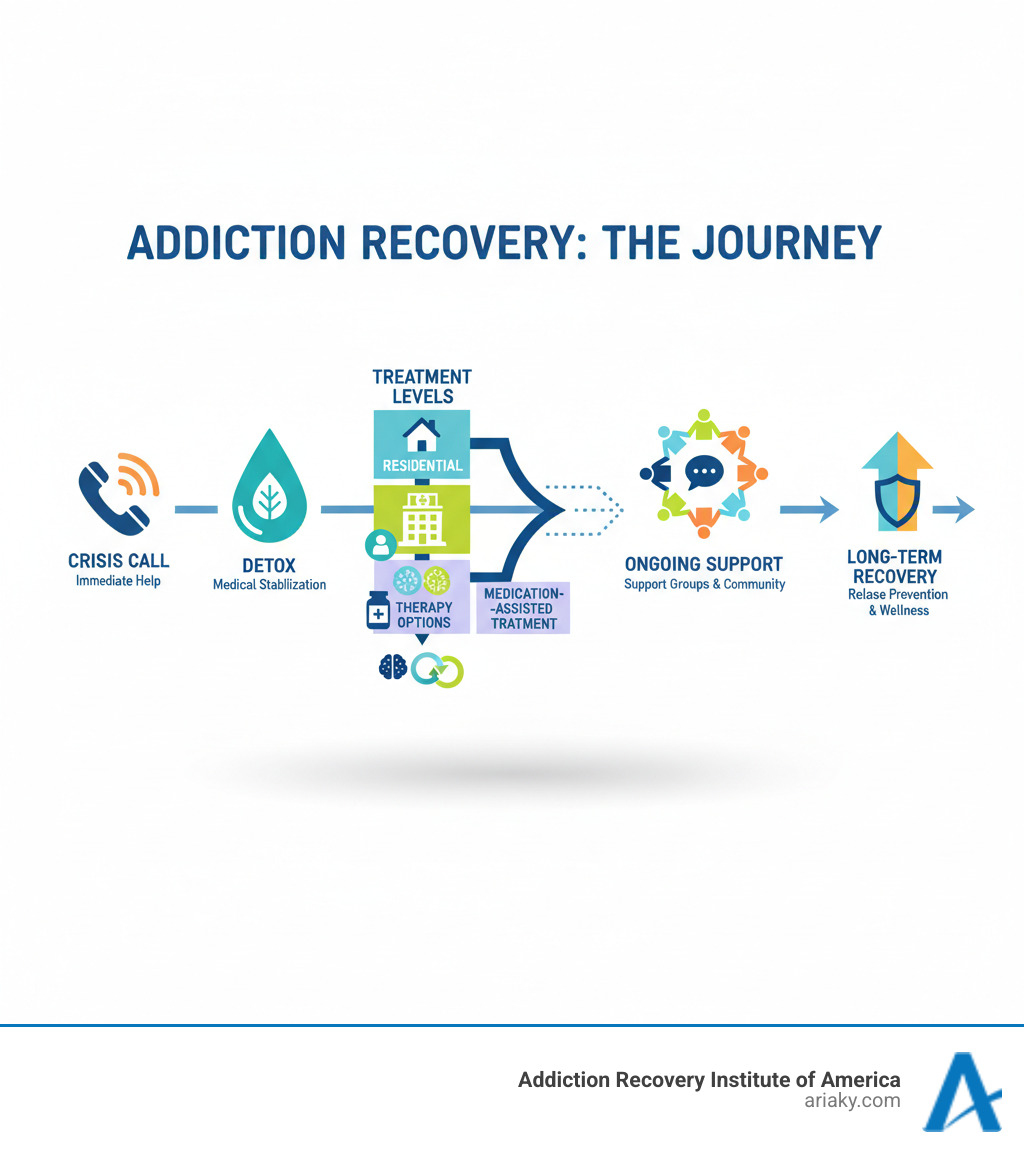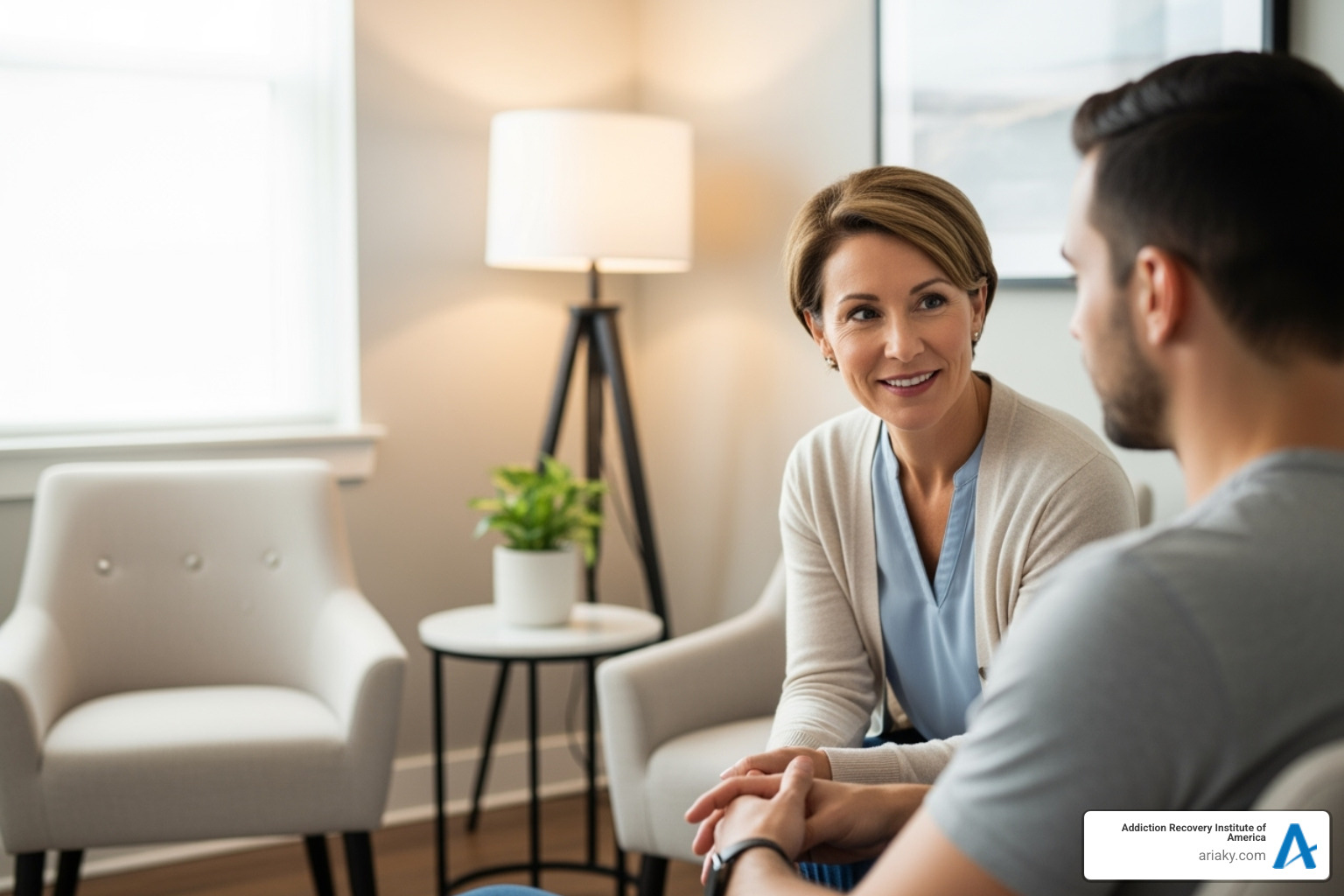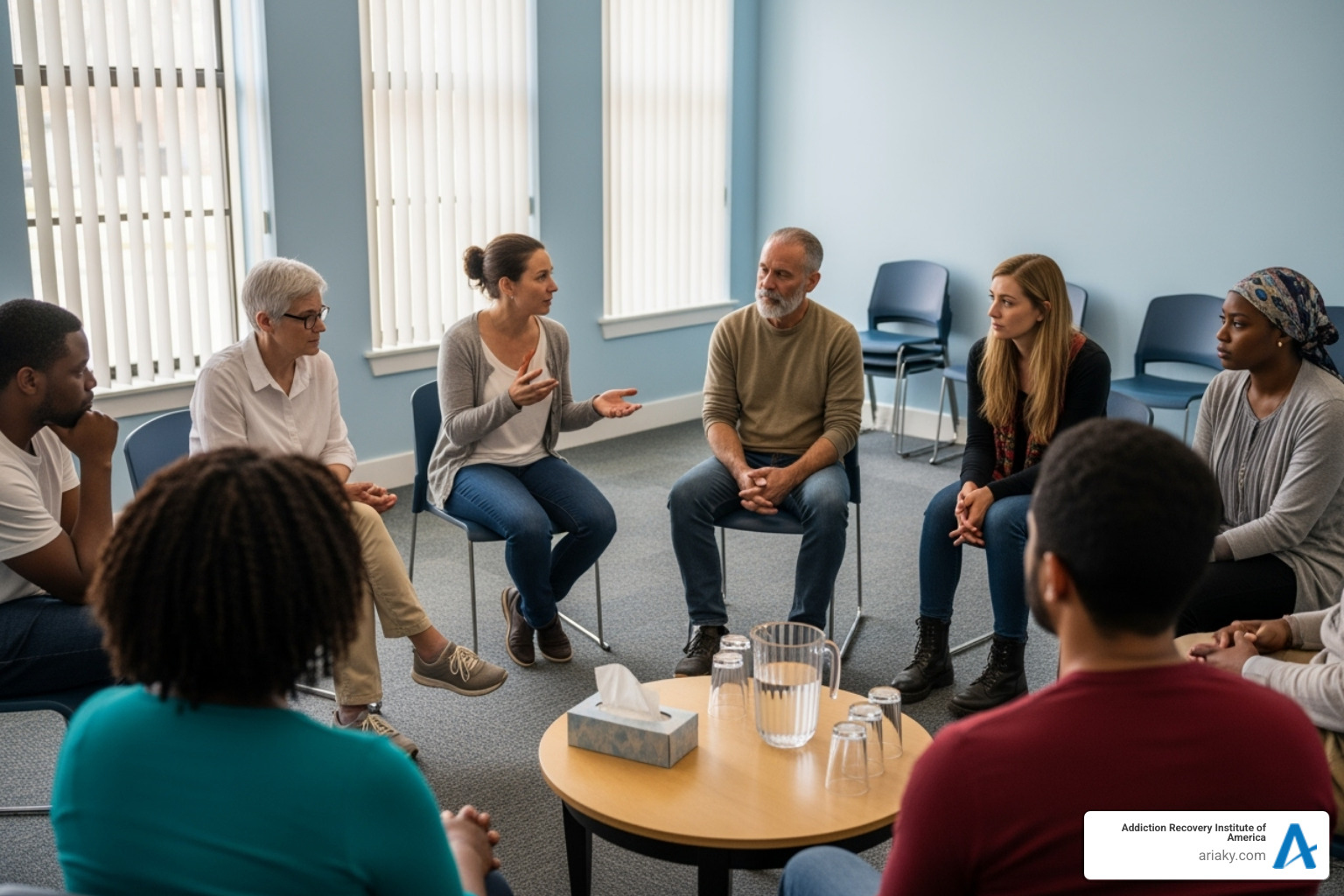Why Seeking Professional Drug Problem Help is Critical for Recovery
Drug problem help is available, and you don’t have to face addiction alone. The good news is clear: addiction is a treatable disorder.
Quick access to drug problem help:
- Crisis Support: Call 911 or go to your nearest emergency department for immediate help
- 24/7 Helplines: Contact SAMHSA’s National Helpline at 1-800-662-4357 for free, confidential treatment referrals
- Your Doctor: Start with your family doctor or GP for evaluation and referrals
- Treatment Centers: Contact licensed facilities like Addiction Recovery Institute of America for comprehensive care
- Support Groups: Find peer support through Narcotics Anonymous (NA) or SMART Recovery meetings
Addiction is a chronic medical condition that creates changes in the brain, causing powerful cravings. This isn’t a character flaw or lack of willpower—it’s a disease that responds well to proper treatment.
Research shows that with the right combination of medical care, therapy, and support, you can break free from addiction and build a meaningful life. This guide will walk you through the steps of finding help, from treatment options to building long-term sobriety.

Taking the First Step: Where to Begin
The hardest part of getting drug problem help is making that first move. Just by reading this, you’re already taking a step.
Your family doctor is often the best place to start. They can assess your health and connect you with local services without judgment. If that feels too difficult, you can call a helpline or a treatment center directly. There’s no single “right” way to start.
Before your first appointment, be prepared to be honest about your drug use. This information helps providers create the best plan for you. Write down questions beforehand and consider bringing someone you trust for support.
What are the different types of help available for a drug problem?
When seeking drug problem help, you’ll find many options:
- Helplines: These 24/7 phone lines offer immediate support and resource information from people who understand.
- Medical Professionals: Your GP, psychiatrists, and addiction specialists provide medical expertise and treatment guidance.
- Therapists and Counselors: They help you understand the root causes of your drug use and teach new coping skills.
- Licensed Treatment Centers: Facilities like Addiction Recovery Institute of America offer comprehensive Substance Abuse Treatment Kentucky programs that combine medical care, therapy, and support.
- Peer Support Groups: Groups like NA connect you with others who have similar experiences, providing ongoing support and accountability.
- Harm Reduction Services: These services focus on safety and health, meeting you where you are in your recovery journey.
Where can individuals find immediate support?
When you need drug problem help right now, turn to these resources:
- Call 911 immediately for any life-threatening situation, like an overdose or severe withdrawal.
- Go to your nearest emergency department for urgent medical concerns.
- Call a crisis helpline like SAMHSA’s National Helpline at 1-800-662-4357 for free, confidential, 24/7 support and referrals.
- Contact us at Addiction Recovery Institute of America. Our team is available to help you understand your options and guide you into treatment.
Help is always available. You don’t have to wait to make the call that can start your recovery.
Understanding Addiction Treatment Options for Drug Problem Help
Finding the right drug problem help requires a personalized approach. Effective treatment is not a quick fix but a long-term management strategy for a chronic condition. It should be designed for your unique situation and address your whole life—physical health, mental well-being, and relationships—not just the substance use.

Detoxification and Comprehensive Addiction Treatment
Detoxification helps your body safely adjust to the absence of drugs. Withdrawal symptoms can be uncomfortable and even dangerous without medical care. Detox is just the beginning. It addresses physical dependence, but addiction is more complex. Without follow-up treatment, relapse is common. At Addiction Recovery Institute of America, our Kentucky Detox Programs provide medical supervision to keep you safe and comfortable. The real work of recovery begins after detox with comprehensive treatment.
Levels of Care in Treatment Programs
Treatment programs offer different levels of support that can be adjusted as your needs change.
- Residential Treatment: You live at the facility 24/7 in a safe, structured environment. Our Residential Treatment Program KY provides this immersive care.
- Partial Hospitalization Programs (PHP): Intensive day treatment while you live at home or in sober living. Our Partial Hospitalization Program (PHP) Kentucky bridges the gap between residential care and independence.
- Intensive Outpatient Programs (IOP): Structured treatment several times a week, allowing you to work or attend school. Our Intensive Outpatient Program (IOP) Kentucky offers this flexibility.
- Standard Outpatient Treatment: Regular therapy sessions while you live at home. Our Outpatient Treatment Program KY provides ongoing support for long-term success.
Behavioral Therapies and Counseling
Behavioral therapies are a core component of drug problem help. They teach you to recognize triggers, change destructive thought patterns, and develop healthy coping skills.
- Cognitive Behavioral Therapy (CBT): Our Cognitive Behavioral Therapy Program helps you identify and change behaviors linked to drug use.
- Dialectical Behavior Therapy (DBT): Our Dialectical Behavior Therapy Program is helpful for managing intense emotions and co-occurring mental health challenges.
- Individual and Group Therapy: Our Individual Therapy Program offers one-on-one support, while our Group Therapy Program KY provides a healing community of peers.
- Family Therapy helps repair relationships and teaches loved ones how to support your recovery.
Medications for Addiction and Withdrawal
Medications can be powerful tools in treating addiction. They are not a crutch but medical aids that reduce cravings, ease withdrawal, and help prevent relapse, especially when combined with therapy. For opioid addiction, medications like buprenorphine are a first-line treatment. Our Opioid Addiction Treatment Program incorporates these evidence-based options. Effective medications are also available for alcohol addiction. Our medical professionals determine the best options as part of a complete treatment plan.
Building a Strong Support System for Lasting Recovery
Help for a drug problem extends beyond doctors and therapists to the people around you. A strong support system is a safety net for your recovery. Addiction often causes isolation, so rebuilding connections and finding new support is crucial. This support can come from peer groups, family therapy, or specialized programs.

The Importance of Peer Support Groups
Peer support groups offer a unique form of drug problem help from people with shared experiences. They provide a safe, non-judgmental space to be honest about your struggles.
- Abstinence-based programs like Alcoholics Anonymous (AA) and Narcotics Anonymous (NA) use a 12-step approach focused on spiritual growth and mutual support.
- SMART Recovery is an evidence-based alternative that uses tools from cognitive behavioral therapy to teach self-empowerment and coping skills.
Both approaches help you build a sober social network, which is essential for long-term recovery.
How can family and friends support someone with a drug problem?
If you love someone with an addiction, your support is vital.
- Educate yourself about addiction as a medical condition.
- Offer support without enabling. This means being emotionally present while avoiding actions that make it easier for them to use.
- Encourage treatment by helping research options or offering to drive them to appointments.
- Set healthy boundaries to protect yourself and create an environment that supports recovery.
Our Family Therapy Program KY helps families steer these challenges together. Healing happens best when everyone participates.
Specialized Resources for Different Populations
Effective drug problem help is not one-size-fits-all. Specialized programs address the unique challenges of different groups.
- Young people need age-appropriate support, available through resources like Kids Help Phone (1-800-668-6868).
- First responders face unique job-related trauma and stress. Our First Responder Addiction Treatment Program Kentucky provides custom care.
- Indigenous communities benefit from culturally sensitive programs like the Hope for Wellness Help Line (1-855-242-3310).
- Gender-specific programs like our Mens Rehab Program and Womens Rehab Program create safe spaces to discuss relevant issues.
Navigating the Path to Sobriety
Recovery from a drug problem is about more than stopping substance use; it’s about rebuilding your life. Sobriety is the foundation for creating a meaningful life with healthy relationships and a sense of purpose. It’s an ongoing journey of growth and developing stronger coping skills.
The Role of Mental Health Support
Drug problem help often involves addressing mental health. Addiction frequently co-occurs with conditions like depression and anxiety. This is called a co-occurring disorder or dual diagnosis. Integrated treatment, which addresses both issues simultaneously, is the most effective approach. It targets the root causes of both conditions. Our Trauma-Related Addiction Program KY is an example of this approach, healing the wounds that can lead to addiction.
Coping with Cravings and Triggers
Cravings are a normal part of recovery. They are temporary, and you can learn to manage them. Triggers are the people, places, or feelings that spark cravings. Identifying your personal triggers is the first step to creating a plan to deal with them. Strategies include calling a sponsor, practicing mindfulness, or using urge surfing techniques. Stress management is also key, as stress is a common trigger. In early recovery, it’s wise to avoid high-risk situations to protect your sobriety.
Understanding Relapse and Harm Reduction
Relapse does not mean failure. Relapse rates for addiction are similar to other chronic diseases. If it happens, it’s an opportunity to readjust your treatment plan and come back stronger. Harm reduction is another key concept in modern drug problem help. It focuses on keeping people as safe as possible. Overdose prevention, including having naloxone available, is a critical part of harm reduction that saves lives. We provide naloxone training and supplies to patients and families, meeting you wherever you are in your journey.
How to Find and Access a Treatment Center
Finding the right treatment center for drug problem help is a crucial step. Start by checking a facility’s accreditation and licensing, which indicate quality and safety standards. Ask about their treatment philosophy, therapies offered, and staff qualifications. Also, consider practical factors like location and insurance.
At Addiction Recovery Institute of America, we are an accredited, AODE-certified addiction rehab center offering individualized treatment plans. We have multiple Kentucky Rehab Facilities and Aria Rehab Locations across the state and in West Palm Beach, making care accessible.
Public vs. Private Treatment Costs
Understanding the financial side of drug problem help is important.
Public treatment programs are often free or low-cost and accept Medicaid/Medicare. However, they may have longer wait times and offer more basic services.
Private treatment centers typically offer quicker access, a broader range of services, and more individualized care. They generally cost more, but many private insurance plans provide coverage.
| Feature | Public Treatment | Private Treatment |
|---|---|---|
| Funding Source | Government agencies, grants | Client fees, private insurance |
| Wait Times | Can be longer due to high demand | Generally shorter, quicker access |
| Service Range | Essential services, may be limited | Broader options, specialized therapies |
| Individualization | May be less personalized | Highly individualized care |
| Insurance | Often free or low-cost | Covered by private insurance plans |
Many private insurance plans, like those from Blue Cross Blue Shield and Aetna Insurance, offer substantial coverage for addiction treatment. We recommend calling your provider to understand your benefits. Our admissions team can also help you verify your insurance and discuss financial options. Don’t let cost concerns stop you from seeking help.
Conclusion
Recovery from a drug problem is a challenge, but remember: you are not broken, and you are not alone. Addiction is a treatable medical condition, not a moral failing.
Taking the first step is the hardest part, but it’s a moment of courage that changes everything. It opens up a world of drug problem help and starts you on a journey to rebuild your life. You deserve a life that is meaningful and fulfilling.
At Addiction Recovery Institute of America, we’ve seen thousands of people transform their lives, and your story can be one of these successes. Our AODE-certified programs are built on the principle that every person’s path is unique. We offer a full continuum of care, from medical detox to long-term support, with specialized programs to meet your specific needs.
If you’re uncertain, that’s okay. Recovery just requires one small step forward. For those needing to start with medical detox, learn more about our Kentucky detox services.
Recovery is possible. Your capacity for change is stronger than your addiction. The hardest part is over—you’ve started learning about your options. Contact us today, and let’s begin your recovery story together.



